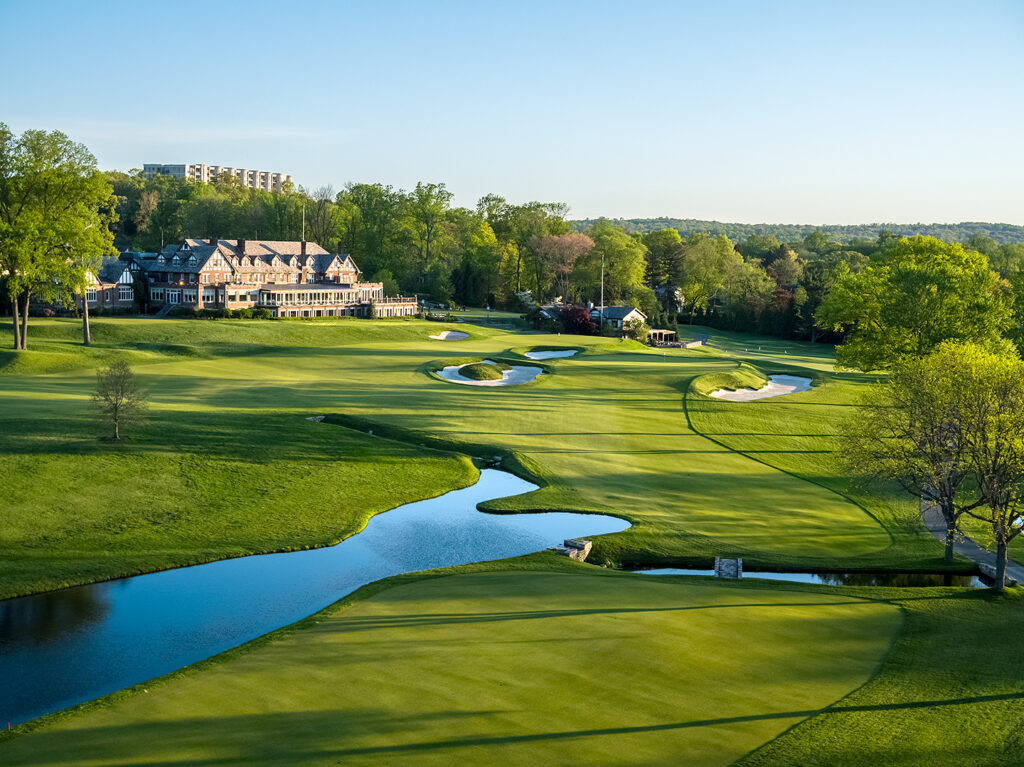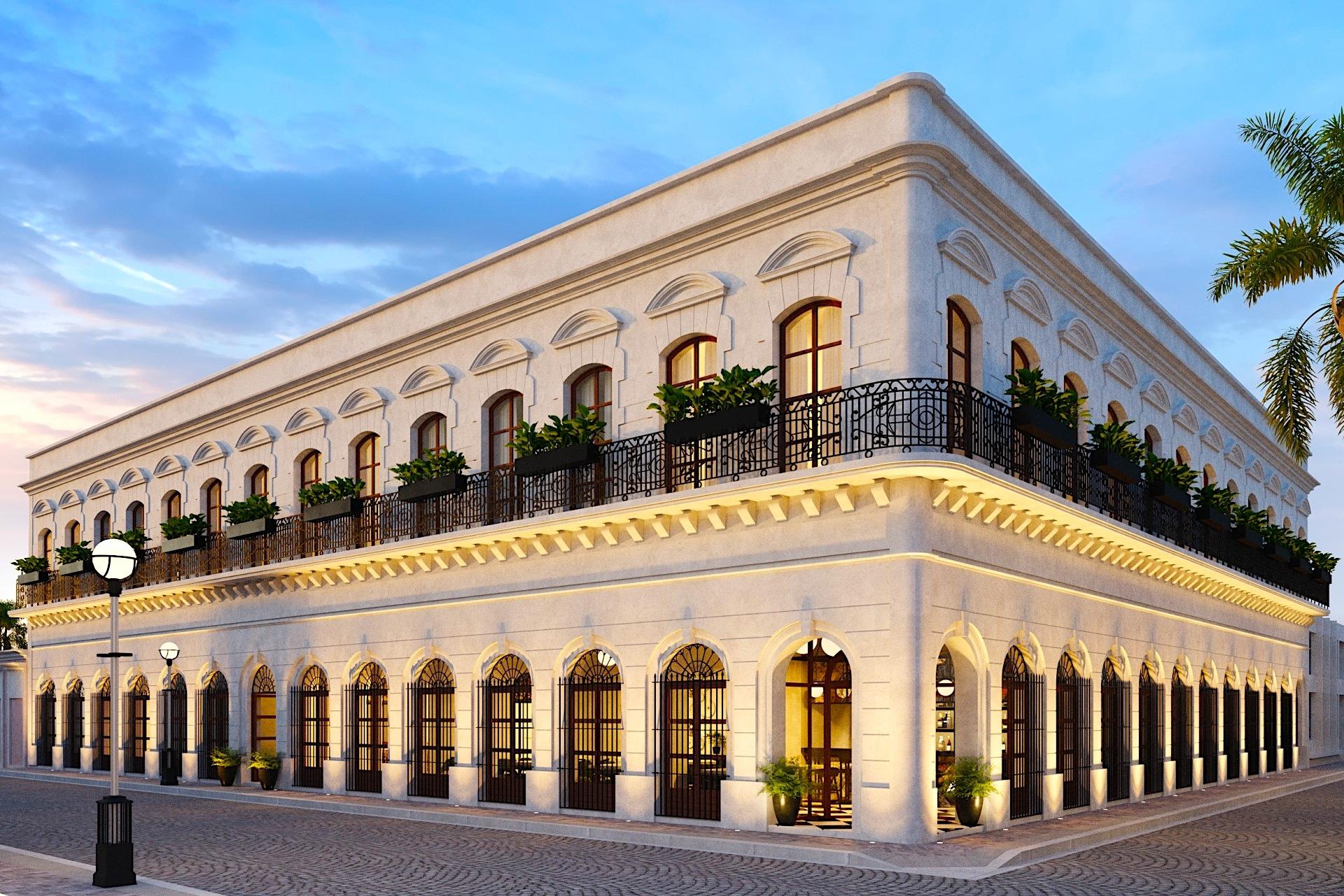PGA Championship in ’29,
8th U.S. Open uncertain
Lower Course updated
by Matt Ward
When the story of American golf is discussed, there will always be a clear inclusion highlighting a venerable golf club in northern New Jersey that occupies 472 acres that has been the staging ground for numerous national championships dating back to golf’s embryo in the United States to present times.
Baltusrol Golf Club, founded in 1895 by Louis Keller, is first and foremost about one primary thing — golf. The 36-hole complex — consisting of 18-hole designs called the Lower and Upper Courses respectively — is the handiwork of renowned architect A.W. Tillinghast.
Spearheaded by the club’ leadership and extending through the ranks of the membership there is great pride in what has happened in past years. There is also a strong conviction in keeping the Baltusrol name front and center as the 21st century unfolds.
In 2014, Baltusrol was named a national historic landmark by the U.S. Dept of the Interior in concert with the National Parks Service — becoming just the fourth golf course named — joining the ranks of previously selected honorees with Merion Golf Club, Oakmont Country Club and Pinehurst.

Starting in 1903 through 1993, Baltusrol staged America’s national championship — the U.S. Open — a record seven times. When the 1993 concluded, it seemed likely future Opens would continue into the 21st century. None has happened since. And none is scheduled through 2027 – the longest stretch of time where America’s premier golf event will not intersect with the club.
As a new century was dawning it become clear the USGA was looking elsewhere for host sites for its flagship event. Pinehurst entered the scene in 1999 and is now a regular fixture for years to come. A return to the New York metro area did happen — but the venue was the first municipally-owned facility to host the championship — Bethpage State Park and its illustrious Black Course taking center stage in 2002 and 2009.
More recently, Winged Foot Golf Club hosted the U.S. Open in 2020 and there has been strong speculation the Westchester County-NY based club may be tapped to host the next available slot in 2028.
Given the ever shifting landscape — of limited openings plus an increased number of interest venues — the distingushed Springfield-based club currently does not have a U.S. Open Championship on the calendar for the foreseeable future.

Up to that point, the only national championships staged at Baltusrol had been USGA events — 16 in total. Only Merion Golf club exceeds that steadfast connection. Given the reality of seeing other new clubs gaining stature from hosting the U.S. Open, Baltusrol entered into discussions with the PGA of America in bringing its most important event — the PGA Championship — back to New Jersey for the first time since 1942.
In 2005 the PGA Championship and Baltusrol benefited immensely with the winner by the name of Phil Mickelson. The popular left-hander had been close in previous major events played in the New York metro area but had never finished an event on top. Having Mickelson hoist the Wannamaker Trophy kept Baltusrol’s name prominent and provided for the PGA of America a location in the nation’s most populous region and at a club with one of the richest of histories.
Eleven years later the PGA Championship returned in 2016. While Jimmy Walker’s major win was not on the same level as Mickleson’s, the atmosphere of large and enthusiastic crowds kept Balturol’s name front and center in the global golf community.
An 8th U.S. Open remains to be seen. Yet, that has not prevented Baltusrol in continuing to make its mark in hosting pivotal events. A 3rd PGA is planned for 2029. In 2023, the KPMG Women’s PGA Championship will mark the first professionally sponsored women’s event at the club.

Given the club’s commitment to upcoming events the earliest an 8th U.S. Open can come to Baltusrol is sometime in the decade of the 2030s. But a recent move by the USGA to keep the championship at certain specific sites — a core four — with the likes of Shinnecock Hills, Oakmont, Pebble Beach and Pinehurst leading the way may only provide limited openings for others.
There is also the competitive nature of other key clubs looking to host the U.S. Open in the northeast and the inevitable pushback from other parts of the country that the national championship of American golf is far too often in the northeast section of the nation.
Even though the U.S. Open has not returned in 28 years — Baltusrol has continued to stage USGA championships with the Amateur played in 2000 and the Junior Amateur in 2016.

This year Baltusrol unveiled its updated Lower Course through the involvement of arguably the sport’s most sought after architect — Gil Hanse. Hanse was the club’s architect of choice and retained him in 2018 to help prepare Baltusrol’s next long-range master plan that started with the restoration of the Lower Course.
The costs for the projects were over $12 million. The Lower had been updated just prior to the 1954 U.S. Open by New Jersey native and highly acclaimed architect Robert Trent Jones, Sr. In later years his son Rees – was hired by the club to further update the Lower and Upper courses respectively.
The Lower Course was closed at the end of the 2019 season and remained closed throughout 2020; the course reopened for member play in May 2021.The primary objective with the latest updating is returning the Lower to the original character envisioned by Tillinghast. Hanse is doing similarly at Oakland Hills in the greater Detroit area with the Donald Ross designed South Course seeking to get the U.S. Open back for the first time since 1996. Interestingly, both Trent Jones Sr. and Rees were involved in both projects in earlier years.

Hanse will also update the Upper Course starting lin late 2023. Baltusrol remains the only club to have both present day 18-hole layouts having hosted the U.S. Open. What is abundantly clear is the club’s determination to remain an active participants in the staging of the sport’s most impactful events. The “new” Lower Course is a clear reaffirmation of the Tillinghast vision with Hanse stating unequivocally his name will not be added to the scorecard since his efforts were primarily about bringing back to life the elements Tillinghast advocated.
In years past, the tight-lipped club was averse in sharing information regarding its plans. But that approach has now been shelved. A recent interview with club president Matt Wirths sheds light on the most important objectives facing Baltusrol.
While Wirths does not link a future U.S. Open return as a “must” item for Baltusrol’s long-term agenda it is hard to imagine a club so intertwined in American golf history will rest until the USA’s national championship is once again played on its storied grounds.
When or if that happens remains to be seenn. But rest assure Baltusrol remains ever vigilant in staying front and center in the global golf picture.and how such matters shake out will be a storyline indeed worth watching unfold.
***
Matt Wirths
President and Master Plan Committee Chair
Baltusrol Golf Club
Interviewed: July 12, 2021
BACKGROUNDER:
Matt Wirths joined Baltusrol Golf Club in 2006, and became the Club’s 34th President in 2020. He previously served as Baltusrol’s Green Committee Chair, and chairs the Club’s Master Plan Committee, which oversaw the restoration of Baltusrol’s famed Lower Course. Wirths is also a member of the Mid Ocean Club and was a member of Mendham Golf and Tennis Club. He previously served as President at Mendham.

Baltusrol Golf Club
THE WIRTHS STORY:
It is truly an honor to serve on the Board of Governors at Baltusrol Golf Club, and to carry on the unparalleled legacy that has shaped our Club over the last 125 years. Baltusrol was founded in 1895 to be a leading golf club in America with a distinguished membership and a shared passion for the game of golf. As stewards of the Club, we strive every day to preserve Baltusrol’s founding vision, and to ensure the Club’s standards and values are upheld for generations to come.
The heart of Baltusrol is its A.W. Tillinghast-designed dual championship golf courses, the first of their kind in America. In 2019, our Club embarked on five-year journey to restore Tillinghast’s original vision for both courses. As Chair of Baltusrol’s Master Plan Committee, it was my privilege to work with architect Gil Hanse and a talented group of members, staff, and contractors to complete the first phase of the project, the restoration of Baltusrol’s Lower Course, in 2021. The result is a course that truly reflects Tillinghast’s original design, while providing an enjoyable test for golfers of all skill levels. We are excited to begin the restoration of our Upper Course in the fall of 2023.
Baltusrol and its members have provided leadership in American golf for 125 years, and our history of hosting major championships is part of our DNA. However, it is the bonds among our members that have made Baltusrol such a special place for me. I will always cherish the friendships formed through the fellowship of golf and a shared love for our Club, and I look forward to the continued success of Baltusrol in the future.
***
When someone hears the words — “Baltusrol Golf Club” what do you hope that will mean to them?
I hope that when someone thinks of Baltusrol they think of a golf centric membership steeped in traditions and history; a club that’s committed to championship golf in America, with two world class championship golf courses that are equal but different.
The broader golf community — both in the USA and globally — went through a difficult time in dealing with the pandemic in 2020 and extending into 2021. How has Baltusrol fared during this time frame?
Baltusrol, first and foremost, was concerned about the safety of its members and staff. We closely followed safety guidelines from the CDC and New Jersey Department of Health recommendations, and when state restrictions allowed us to resume operations at the club, we were committed to creating a safe environment for all members, guests, and employees. We were also committed to providing exceptional value to our members, despite the challenges the pandemic presented.
Our golf courses and practice facilities were busy, and inside the Clubhouse, we created a takeout and delivery dining service for members to enjoy safely at home, and we opened the Baltusrol Marketplace to provide members with essential items that were difficult to come by at their local stores. Our members were always supportive and understanding, and we were able to take a bad situation and make it a little more palatable.
Baltusrol recently reopened its renowned Lower Course and during a recent press conference the focal point was on re-establishing the intent of original designer A.W. Tillinghast. Given that, was the modernization effort carried out in the 1950s and 1960s by Robert Trent Jones, Sr., and then by his son Rees in the years to follow — a mistake?
Absolutely not. There have been a lot of changes with equipment and agronomy over the last 125 years, and for a lot of classic golf courses to keep pace with the evolution of technology, adjustments had to be made. With the modern agronomic technologies of today, we are fortunate to be able to restore A.W. Tillinghast’s original design with a sympathetic restoration and upgrade the course’s infrastructure while still providing a challenging championship test of golf.

Gil Hanse was hired by Baltusrol to do the architectural work — on both the Lower Course and forthcoming on the Upper Course as well. What was the tipping point in selecting him for the assignment?
I think the tipping point was when he said it was not his name on the scorecard, but that it was A.W. Tillinghast. I thought that took a great deal of courage on his part, and showed his commitment to restoring the course’s original design intent. I have the deepest respect for him to place his ego aside, and I cannot wait to see what he does on the Upper Course in a few years.
In recent years the intensity of golf course rankings — by various publications and outlets — has been a major point of contention and, at times, controversy. Does Baltusrol monitor such results and does such findings have an impact on what is eventually planned and carried out by the club’s leadership?
We are aware of the rankings, but the driving force behind the decision to restore our golf courses was a commitment to providing all of our members with near championship conditions and an enjoyable round of golf on a daily basis. In 2014, Baltusrol received National Historic Landmark status for its architectural significance between the years of 1918 and 1936, and when we developed the master restoration plan, Tillinghast’s architectural design served as a beacon for us.
Baltusrol has been the staging ground for a range of important championships since its inception and will be hosting in the years ahead the KPMG Women’s PGA Championship (2023) and the PGA Championship for a 3rd time in 2029. But the key event missing on the future agenda is the U.S. Open which the club has hosted seven times. The last Open played was in 1993, and in all likelihood, the next available slot won’t happen until the 2030s – marking the longest time between host roles. Is getting the U.S. Open to return a central goal for the club?
Baltusrol has had a 125-year relationship with the USGA, and it has been an enduring partnership. We are happy to host any of the national championships the USGA holds each year.

The club hosted the U.S. Open in 1954, 1967, 1980 and 1993. Why do you think the 13- year interval ceased happening as we moved into the 21st century?
The game of golf changed has evolved over the last 30 years, and the scope of the U.S. Open has also evolved over that span to include more venues. Since 1954, Baltusrol has also hosted two U.S. Women’s Opens, the 2000 U.S. Amateur, and the 2018 U.S. Junior Am. For Baltusrol and the USGA, it is about more than the U.S. Open. We have a strong relationship and remain committed to hosting a variety of championships and showcasing the game’s best.
Various golf clubs throughout the USA are looking to attract new members — especially among Millennials, women and minorities. What game plan is Baltusrol following in this specific matter?
Baltusrol is proud of its diverse membership. Our mission is to provide the best golf experience possible, and we welcome anyone who has a love and passion for the game.
If you could change one thing in golf unilaterally — what would it be and why?
It would be to remove the gender and age bias of specific tees. We’ve taken steps to address that at Baltusrol, including numbering our tees instead of assigning name designations, and we’ve also created combo tees and encourage members and guests to play from the appropriate tees. We want to make the game more inclusive, and ensure everyone has the opportunity to have an enjoyable round of golf.

The biggest challenges — short and long term — facing Baltusrol are what and how are you moving ahead now in dealing with each of them?
The biggest challenge short term is completing the Upper Course restoration. We are properly preparing for the project, and while supply chain issues have presented some challenges, we are dealing with that and we are excited to get started. Long term, it is critical that we make the right choices for the continued sustainability of our Club while preserving our culture, history and tradition for generations to come.













